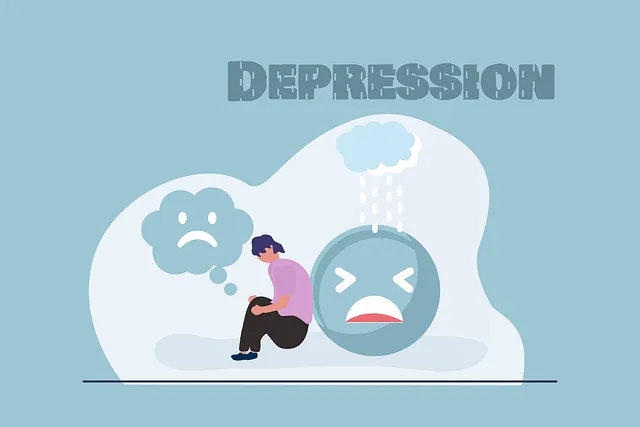Mental health professionals in Greenwood Village face unique challenges like burnout and secondary traumatic stress. Kaiser Permanente offers tailored support, including self-care resources, social skills training, and stress management, to help them maintain well-being. Their comprehensive program incorporates in-person therapy, online counseling, and digital tools for emotional wellness prevention. Through risk assessment best practices, continuous learning, and public awareness campaigns, Kaiser Permanente ensures the safety and high-quality care of both clients and practitioners in Greenwood Village. Case studies highlight successful navigation of high-risk situations, emphasizing the importance of proactive self-awareness exercises.
Mental health professionals (MHPs) face unique risks on a daily basis, from high-stress environments to potential patient hazards. This article delves into the critical aspect of risk assessment for MHPs, offering a comprehensive guide to managing these challenges. We explore the broader landscape of mental health professional risks and provide insights through case studies, focusing on navigating high-risk situations in Greenwood Village. Additionally, we examine Kaiser Permanente’s mental health coverage and best practices for assessing risk in clinical settings, empowering professionals with strategies to mitigate risks and enhance patient safety.
- Understanding Mental Health Professional Risks: An Overview
- Kaiser Permanente Mental Health Coverage: What It Offers
- Assessing Risk in Clinical Settings: Best Practices
- Case Studies: Navigating High-Risk Situations in Greenwood Village
- Strategies for Mitigating Risks: Ensuring Safety and Quality Care
Understanding Mental Health Professional Risks: An Overview

Mental health professionals, like therapists, counselors, and psychiatrists, often find themselves at a unique intersection of intense emotional engagement with their clients. This inherent nature of their work comes with risks that can impact both their well-being and practice sustainability. These risks encompass a range of challenges, from burnout due to high caseloads and emotionally demanding sessions to potential trauma reliving or secondary traumatic stress (STS). The complex nature of mental health practice necessitates a holistic understanding of these risks to ensure professionals can effectively manage them.
One notable aspect in navigating these risks is the support structure available through organizations like Kaiser Permanente, which offers mental health coverage and resources tailored for healthcare professionals. This includes programs focused on self-care, such as Mindfulness Meditation and Stress Management training, alongside initiatives promoting Social Skills Training to enhance interpersonal interactions and emotional resilience. By acknowledging and addressing these professional risks proactively, mental health practitioners can maintain a healthier work-life balance while delivering higher-quality care to their clients in Greenwood Village and beyond.
Kaiser Permanente Mental Health Coverage: What It Offers

Kaiser Permanente offers comprehensive mental health coverage tailored to meet the unique needs of professionals in Greenwood Village and beyond. Their plans are designed to support mental wellness, prevent burnout, and foster healthy coping skills development. Through a combination of in-person therapy sessions, online counseling options, and digital resources, Kaiser Permanente ensures accessibility to quality care.
The program encourages proactive mental health management by providing guidance on effective journaling exercises, mindfulness techniques, and other self-care practices. This holistic approach empowers professionals to maintain their emotional well-being while navigating the demanding nature of their careers. By leveraging Kaiser Permanente’s mental health coverage, Greenwood Village residents can access the support they need to thrive in their personal and professional lives.
Assessing Risk in Clinical Settings: Best Practices

In clinical settings, assessing risk among mental health professionals is paramount to maintaining a safe and supportive environment for both practitioners and clients. Best practices involve comprehensive risk assessment tools tailored to identify potential hazards specific to the field of mental healthcare. These include evaluations of personal history, current mental state, substance use, and past trauma, as these factors can significantly impact an individual’s ability to manage stress and maintain boundaries.
The Mental Wellness Podcast Series Production by organizations like Kaiser Permanente in Greenwood Village emphasizes the importance of continuous learning and self-care among mental health professionals. Integrating this culture of awareness into risk assessment practices is crucial. Regularly updating assessment protocols, drawing from evidence-based research, and participating in programs designed for Mental Health Education (like those offered by Kaiser Permanente) can help identify emerging trends and best address the unique challenges faced by these professionals. Additionally, developing Public Awareness Campaigns (similar to initiatives focused on expanding mental health coverage) can foster a broader understanding of these issues, reducing stigma and encouraging early intervention and support.
Case Studies: Navigating High-Risk Situations in Greenwood Village

In Greenwood Village, case studies highlight the intricate navigation of high-risk situations among mental health professionals. These scenarios often emerge within the context of Kaiser Permanente mental health coverage, underscoring the importance of robust risk assessment strategies. Professionals must be adept at managing stress and cultivating self-awareness exercises to mitigate potential risks effectively. For instance, a study analyzed a case where a therapist encountered a client with severe emotional distress, requiring immediate intervention. The therapist’s ability to maintain composure and utilize positive thinking techniques played a pivotal role in de-escalating the situation.
Through these case studies, mental health professionals in Greenwood Village gain valuable insights into navigating challenging environments. By understanding the importance of stress management and self-awareness exercises, they can enhance their practice, ensuring the safety and well-being of both clients and themselves. This proactive approach aligns with Kaiser Permanente’s commitment to comprehensive mental health coverage, fostering a supportive environment for all involved.
Strategies for Mitigating Risks: Ensuring Safety and Quality Care

Mental health professionals play a vital role in helping individuals navigate their mental well-being, and it’s crucial to implement strategies that mitigate risks while ensuring safety and high-quality care. At Kaiser Permanente Mental Health Coverage in Greenwood Village, we prioritize proactive measures to safeguard both clients and practitioners.
One key approach is integrating Trauma Support Services, as many individuals seeking mental health support carry the weight of trauma. Providing a safe, non-judgmental space and offering specialized Anxiety Relief techniques can significantly enhance therapeutic outcomes. Furthermore, cultivating Cultural Sensitivity in Mental Healthcare Practice ensures that professionals are equipped to address diverse client needs, promoting inclusive and effective treatment. Through these comprehensive strategies, mental health professionals can foster an environment where clients feel understood, supported, and empowered on their journey towards improved mental health.
Mental health professionals face unique challenges, necessitating a comprehensive risk assessment approach. This article has explored these risks, highlighting the importance of understanding them to deliver quality care. The discussion on Kaiser Permanente’s mental health coverage and case studies from Greenwood Village offer valuable insights into managing high-risk situations. By implementing best practices for clinical risk assessment and adopting strategies to mitigate risks, professionals can enhance safety while providing effective treatment, ultimately fostering healthier communities.






